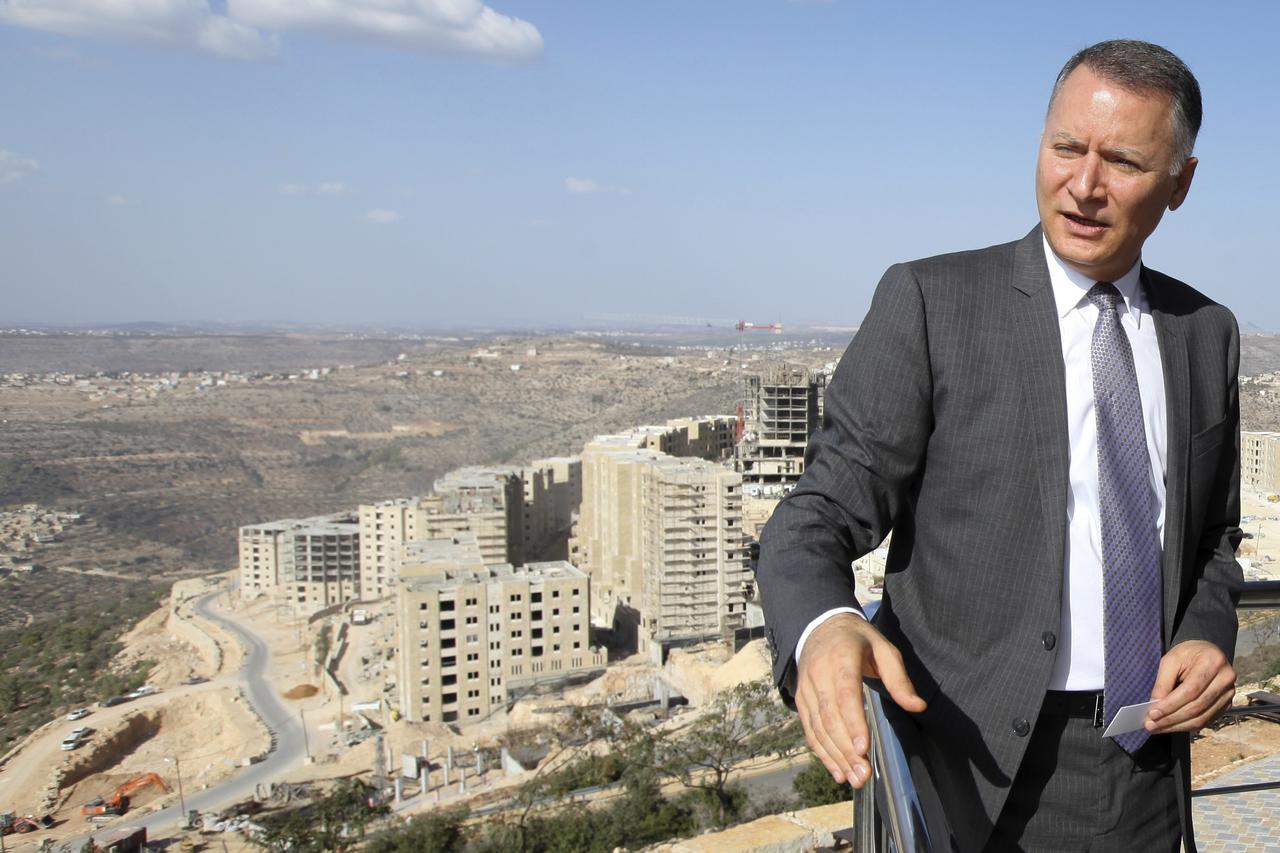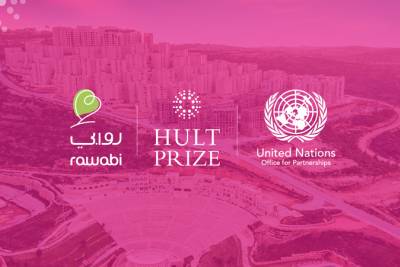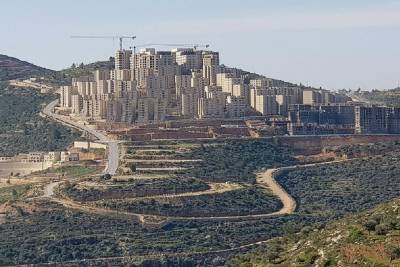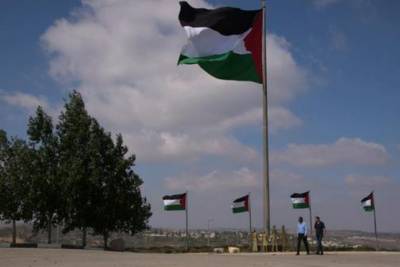In the war-torn landscape of the West Bank, Bashar Masri sees an endless field of gleaming condos, and a future for his people.

Narratively - Aya Lowe - What keeps Bashar Masri awake at night is worrying about the failure of his vision.
The Palestinian-born, American-educated entrepreneur’s mission is to build the largest private-sector project and the first planned city in Palestinian history. In turn he hopes to generate thousands of jobs and build a model that can apply across the West Bank.
“My vision is to build a sustainable city that could be duplicated,” Masri, fifty-three, explains. “If I sell the real estate, which is the easy part, but fail to create jobs, then the vision fails. But if I can create jobs it means you can take the model and dump it in a depressed area next to Jenin, Jericho or Bethlehem and generate thousands of jobs.”
Masri’s project — named Rawabi, which means “hills” in Arabic — has been taking shape on the hills between Ramallah and Nablus in the West Bank since 2010. Upon completion, it will be the first of its kind here, in both structure and design. The residential section will house around forty thousand residents in condominium buildings linked by green walkways and outer ring roads. On a clear day, residents will be able to enjoy a panoramic view of the Mediterranean Sea forty kilometers away. Just below the condos will be a twenty-thousand-seat amphitheater, a convention center, a theater, a park and rows of shops, with a grand staircase snaking up the hill, connecting it all.
Masri’s plan is a vast departure from existing Palestinian cities such as Nablus or Jenin, where there has been no formal urban planning, few communal areas for leisure or entertainment, and where buildings are often crumbling or riddled with bullet holes, and topped by unsightly black water towers.
The plan is all the more ambitious given Masri’s background. “I’m not a real estate developer and I’ve never built a city,” he admits.
A wiry man of medium height, Masri seems to always be moving, whether picking up a phone, hammering his fist down for emphasis or calling one of his assistants in to check on one detail or another. Born in Nablus, he comes from a wealthy family; his uncle Munib al-Masri is known as the “Palestinian Rothschild” and often cited as the world’s richest Palestinian.
Masri began his career as a chemical engineer and worked in management consulting in Washington, D.C., before moving back to Ramallah in the mid-1990s. He has since founded and nurtured several businesses across the West Bank, including the Palestinian daily newspaper Al-Ayyam. His limited experience in real estate development has included overseeing a middle-income housing project in Morocco, a commercial and residential development in Jordan and a recreational project in Egypt. He hopes that developing the private sector here will serve as a path for Palestinian economic growth.
“I would classify myself as a practitioner,” says Masri. “We have been looking at best practices all over the world and we’ve implemented them here within our means. We have a special piping system to collect water from the roofs, and the lights in the streets are LED light, which consumes less electricity.
“However, because of certain financial restrictions there are a lot of things we can’t do. For example, we would love to have solar-powered electricity but we cannot afford it — and if we can’t afford it, then the consumer can’t afford it.”
While keeping Western practices in mind, Masri has been very conscious about making the project as local as possible. The buildings are constructed from stone quarried just a few feet way from where the development is now rising.
Through his private conglomerate, Massar International, Masri has contributed one-third of the $1 billion invested in the project so far. The rest has come from Bayti Real Estate Investment Company, his property investment arm, with a loan backed by Qatar Diar Real Estate Investment Company. The Palestinian Authority was initially supposed to contribute $150 million to cover the costs of building schools, a police station, and some other public amenities. However, that money has yet to materialize.
A project of this scale and quality might seem out of place in the West Bank, where the per capita annual income is $1,610 and unemployment rate is more than twenty percent.
Yet the real estate market has been on the upswing in the region, with property prices in Ramallah particularly pushed up due to lack of space and a large population of well-paid foreign NGO employees and diplomats.
In Rawabi, housing prices range from $75,000 to $150,000. Masri says he is looking for a base population of at least fifteen to twenty thousand local residents before he starts focusing on international buyers.
“We do have interest from Palestinians living in Israel and international investors, but I’m not selling to them yet as I want to focus on the local population first,” says Masri.
“I want to build a community,” he continues. “I want people who own the flats to live there because they set the culture for the future. Owners care about the flat and the community.”
In contrast to the rest of the West Bank, where different Christian and Muslim sects often live in segregated communities, Masri says he wants to ensure a completely mixed demographic. To do so, he has introduced a policy dictating that no one can know who their future neighbor is prior to moving in to Rawabi.
“Everyone wants to know [who their neighbor will be],” says Masri. “Some people don’t want to buy when they can’t find out. But we are committed to creating a melting pot of the Palestinian people from all the villages and cities, and all economic levels of society.”
In the meantime, the project has already created about five thousand construction jobs, making it the single biggest private sector employer in the West Bank. As the development opens up and residents start moving in, Masri’s target is to generate another three thousand jobs in the next five years.
Along with overseeing construction of the project, Masri spends his days negotiating with international companies to make sure there will be jobs and retail stores ready for the city’s inhabitants. He has been eyeing IT, outsourcing and telecommunications companies, as well as a number of banks and international retail names. Masri is hoping for a fifty-fifty mixture of local and international companies, which is going to be a challenge.
“We have a flood of local companies interested but we have very [few] international companies,” he says. “They have come to Rawabi to make an assessment, but the problem is not Rawabi, it’s Palestine and the political situation. They’re afraid to come here. Their main concern is how to get their inventory past checkpoints and how to get working visas.
“But,” he adds, “I want to find companies whose leadership will make an initiative from their heart.”
Masri’s biggest obstacle lies in the multiple restrictions enforced by the Israeli government on the section of the occupied territories where Rawabi is located. Part of the land is located on what the 1994 Oslo Accords designate as “Area C,” where Israel maintains both security and administrative control. Trying to gain road permits and access to transport material and get workers to the site is a daily struggle. Cement mixers and trucks have to cross a two-lane road that curves through an olive grove. Road access is only temporary and the permit for it needs to be renewed every several months. Masri is lobbying for a new road linking Rawabi with Ramallah, just over an hour away.
The development has attracted much praise as the flagship project of a future Palestinian state, but it has also created a stir, with some critics citing the similarities between the city’s structure and that of the Israeli settlements that dot the nearby hillsides.
“I find that ridiculous,” responds Masri. “Should I leave the top of the hill so real settlers can come and occupy it?… Should I make it unorganized to make a point? I understand the sensitivity, and that’s why if you look at Rawabi, there are no red roofs, which are what settlements have.”
“Everyone is entitled to their opinions and it’s healthy to have different opinions,” he continues. “The criticism we get is from the minority and it’s dropping every year dramatically.”
The first six hundred families moved in at the end of 2013 and construction of the other phases is well underway, but Masri has a long stretch ahead of him before he can sleep well. He has envisioned a future where the West Bank is economically independent and this is his shot at it.
“I need to turn the ignition on and jump-start the city,” he says. “So far I have only generated six hundred jobs and need to boost it to 1,500.” While bringing the project to completion is a heavy burden, he enjoys the challenge.
“It’s difficult but it’s a lot of fun,” he says, waving his hands in the direction of the bustling construction site. “I love every moment of it.”
To view original article, Click Here.



